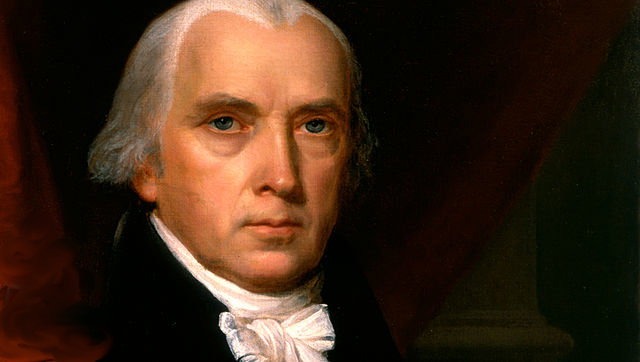For four months, James Madison served as scribe recording the debates, arguments, and compromises that took place in Philadelphia during the Constitutional Convention. It had been contentious. There was the Virginia plan proposal versus the New Jersey plan. Federalist against the anti-Federalists. How to handle the slavery issue. It certainly had taken a lot of thought and effort to reach agreements. There had been anger and frustration at times. But finally, the Constitution was considered finished, and the convention was over.
Imagine Madison quietly contemplating that finalized piece of paper as it rested on the desk in front of him. It was impressive with its beautiful calligraphy and the signatures of many, but not all, of its creators. Madison must have thought deeply about what it contained, then rolled it up, urging it forth for the required ratification, where at least 9 of the 13 states had to accept it as the guiding document for the young nation. Later reflecting upon that paper, he was moved to write:
"As the instrument came from them it was nothing more than the draft of a plan, nothing but a dead letter, until life and validity were breathed into it by the voice of the people, speaking through the several State Conventions. If we were to look, therefore, for the meaning of the instrument beyond the face of the instrument, we must look for it, not in the General Convention, which proposed, but in the State Conventions, which accepted and ratified [it]."
Yes, it was a dead lifeless piece of paper filled with lofty ideas granting citizens equal opportunities. It outlined a plan by which the government would have enough power to act on a national level, but without so much power that fundamental rights would be at risk.
A limited, well-defined government would be separated into three branches, including checks and balances on those powers to assure that no one branch of government gained supremacy. It stated a few specific areas of control, with all other powers not addressed remaining with the states. It was a piece of paper filled with great ideas and wonderful concepts. But no one really knew whether or not it would work.
The Constitution did indeed work. America flourished. She became the wealthiest and strongest nation the world has ever known. Slavery was slowly abolished. She became a country known as a “melting pot” of peoples. There have been countless changes in society over the years, but even to the 21st century the Constitution has proven to be the bedrock of America’s legal life.
But sadly, over its lifetime, that guide has been abused, analyzed for loopholes allowing special interest groups to do as they want. Enemies of America have found ways to circumvent, distort, and severely weaken that magnificent guide. It has been modified by decades of court decisions and inaccurate interpretations. With the addition of the Bill of Rights, the Constitution contained only about 4040 words in 1791. Today, a book of over 3,000 pages holds our Constitution.
In virtually every aspect of Federal governance, there is overreach far beyond the original intent of Madison and his cohorts. Our cultural norms based in Judeo-Christian beliefs are being destroyed by a bloated, self-serving bureaucracy and hostile ideologies. We see our security and many of our freedoms being taken away by regulations and unwise policies. Our government is out-of-control with no hope of self-correction, and the pace at which these degradations are occurring is quickening.
There is great need for the states of the union to invoke Article V of the US Constitution to rein in our Federal Government. Fortunately, the Convention of States movement is gaining momentum prompting the states to push back. The convention proposed will be for the purpose of writing amendments to the US Constitution to address three specific areas: fiscal responsibility, term limits for Federal offices, and government overreach. Once ratified, amendments addressing these three areas cannot easily be defeated by career politicians in Washington and can restore the original intent of our Constitution.
If the Constitution is to regain its power to guide this country, it will be as Madison said, “If we were to look, therefore, for the meaning of the instrument . . ., we must look for it, not in the General Convention [the Congress, the Courts, or the White House] . . . but in the State Conventions, which accept and ratify [it].”
Just as in Madison’s time, these new amendments will be written on paper where they will remain as dead letters until the citizens of this country bring them to life through the ratification process in at least 38 of our 50 state legislatures. Time is running short. Help your legislature see what needs to be done.
Please visit www.conventionofstates.com and join the movement to restore our Constitution.


